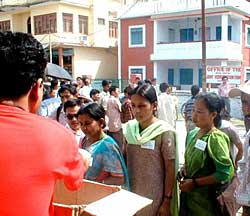 In a fresh bid to resolve a continued deadlock over the future of the 100,000 Bhutanese refugees in camps in eastern Nepal, Thimpu is on a charm offensive targeted at Nepali politicians.
In a fresh bid to resolve a continued deadlock over the future of the 100,000 Bhutanese refugees in camps in eastern Nepal, Thimpu is on a charm offensive targeted at Nepali politicians. Latest to get red carpet treatment were Chakra Prasad Bastola, former foreign minister and one of the architects of the verification agreement for refugees last year, and opposition leader Madhav Kumar Nepal of the UML.
"The Bhutanese leadership probably reckons that both Bastola and Nepal are prime ministers-in-waiting, and they want to cover both bases," explained one senior Nepali academic. The two met Bhutanese king Jigme Singye Wangchuk, chit-chatted with other officials, including Foreign Minister Jigme Thinley, the point man heading bilateral talks on refugees, and packed in some sight-seeing of the dzongs. The two also stopped by at Bhutan's Chuka hydroelectric project to get a few tips on selling power to India. Madhav Nepal, for his part, brainstormed with the Bhutanese on drafting their new constitution, which could benefit from Nepal's experience of the past 12 years.
"It was my first real opportunity to meet the Bhutanese informally," Bastola told us. "I sense there is willingness in Bhutan to get the refugee problem resolved." Bastola asked the king why Bhutan was insisting on going back to the 1994 agreement to classify refugees into four groups: Bhutanese who have been evicted, those who voluntarily emigrated, those who have criminal records, and non-Bhutanese. The king's reply: "Sometimes you have to." Bastola said the king appeared concerned that Nepalis residing in India may have infiltrated the refugee camps at the peak of the influx in the early 1990s. It is this attempt to categorise them that is holding up repatriation of an initial batch of refugees.
Nepali officials have been trying to fix a date for the next round of ministerial talks to decide on repatriating those who have been verified. But Bhutan is sticking to its four-group category, which goes by the buzzword "harmonisation". Nepal maintains that there are only two categories of refugees: Bhutanese or non-Bhutanese.
Nepal and Bhutan completed the joint verification of about 12,000 refugees living in the Khudunabari camp in December, a process that took a year. At this rate it will take at least five years to screen the remaining 88,000 refugees.
"On our side we're ready to meet given a week's notice. We are ready," Foreign Ministry spokesman Gyan Chandra Acharya told us. The problem seems to be that there is no timeframe for either talks, or repatriation. Journalist Surya Thapa asked Foreign Minister Thinley in Thimpu why Bhutan was dragging its feet. Thinley replied: "We are also sick of this problem, but it is a complicated issue. Separating real Bhutanese from illegal migrants is no easy task. The reason for the delay is that it is being needlessly politicised."
For Bhutanese human rights activist Ratan Gazmere, the Bhutan government is just trying to buy time. He concludes: "The Nepal government by itself is not capable of resolving this deadlock, it needs to get the international community to pressure Bhutan the way it did to get it to agree on verification."


